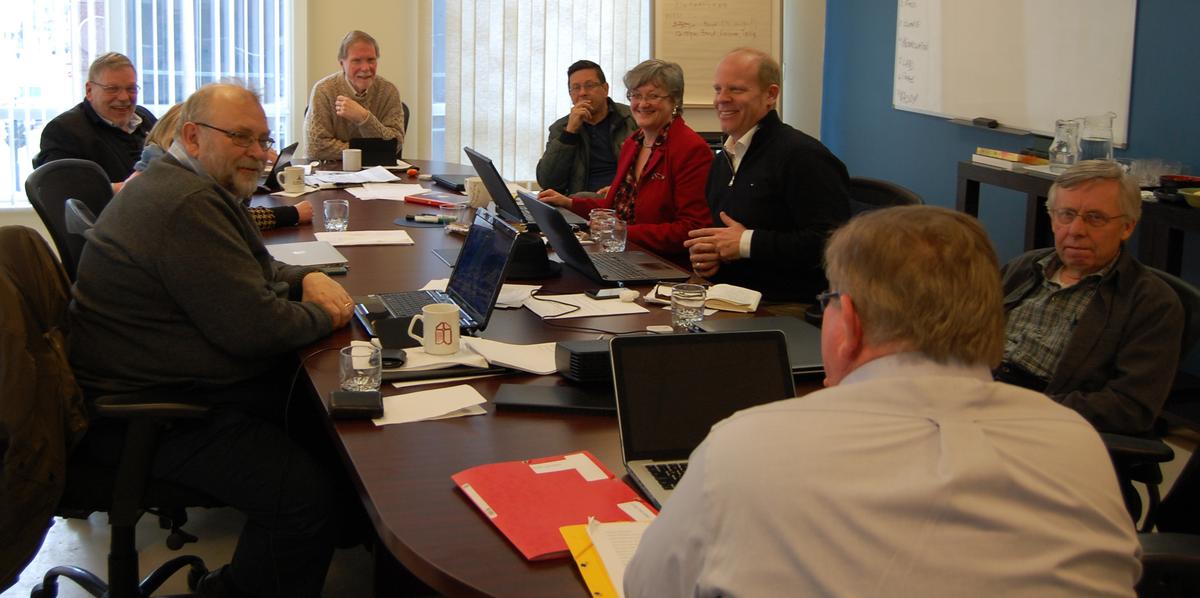With substantial progress made in the revision of contemporary language liturgical texts used by the Anglican Church of Canada, the Liturgy Task Force expects to have a wealth of new material ready for General Synod 2016.
Among the resources it hopes to present are a series of inclusive-language psalms, a full set of morning and evening prayer liturgies, and alternative collects for all three years of the Revised Common Lectionary.
The task force also plans to present an electronic version or platform for the Eucharistic Ordo (the structure of the Eucharist) and some alternate baptismal liturgy—the focus of members who assembled at Church House in Toronto from March 2-4.
“It went well,” the Rev. Canon Andrew Asbil, task force chair, said of the discussion. “We made some good progress on the Ordo in pulling together the educational components to it that help form a base for liturgy, and helping clergy as well as lay folk to plan liturgies.”
The origins of the Liturgy Task Force began near the 25th anniversary of the Book of Alternative Services. Authorized by General Synod in 1985, the book was long expected to undergo later review and revision.
By 2007, it was apparent that many communities were writing their own liturgical texts that spoke to their local perspectives.
“One of the things that’s a core Anglican value is that we have common prayer…Whether we call it the Book of Common Prayer or not, the common prayer tradition holds us together,” task force member and Director of Faith, Worship and Ministry the Rev. Dr. Eileen Scully said.
“So what are the things that, in terms of language, in terms of texts, need to be in common language, and what are the local variances and different expressions that can happen?”
National church decisions further necessitated a revision of the liturgical materials, with Scully pointing to the change from a two-year to a three-year lectionary cycle as an example.
Established by General Synod following the creation of a 2010 document setting out principles behind liturgical revision, the Liturgy Task Force began work in 2011.
The Rev. Peter Wall, a member of the task force, identified two key challenges to the project.
“One is that we’re changing the way we understand the delivery of liturgical materials—from a book of which we print many copies…and everybody has the same book, to a broader menu of choices,” Wall said.
The other, he added, is that “we want people to risk trying something new so that they can react to it and reflect on it and pray [on] it, and then let us know so that we can continue to revise it.”
Task force members meet face-to-face twice each year. Drawing upon sources from churches throughout the Anglican Communion, they spend much of their time writing, editing and debating new material and language issues.
Upon completing new material, resources are posted to the trial use page of the national church website.
“We get a fair amount of feedback, most of it very helpful, some of it very critical,” Wall said. “But even the critical stuff is helpful.”
As it prepares for 2016, the task force will be finishing the bulk of written material and consulting with liturgical officers from different dioceses and the House of Bishops.
Depending on the decision of General Synod, Asbil noted, their work may yet continue thereafter.
“There’s a real call for some new pastoral rites, whether that’s for marriage or funeral liturgies or ministry at the time of death…There’s lots and lots and lots of work to be done.”
View liturgical texts for trial use and feedback.
Interested in keeping up-to-date on news, opinion, events and resources from the Anglican Church of Canada? Sign up for our email alerts .

